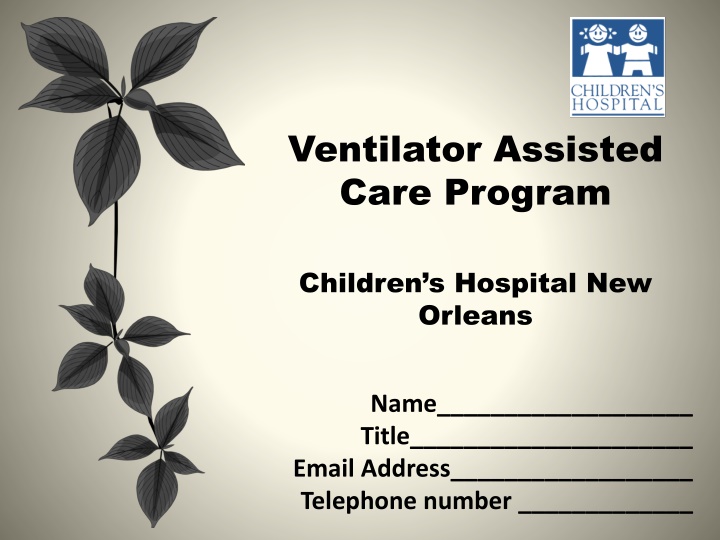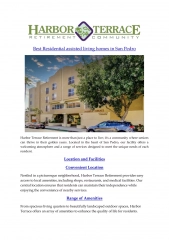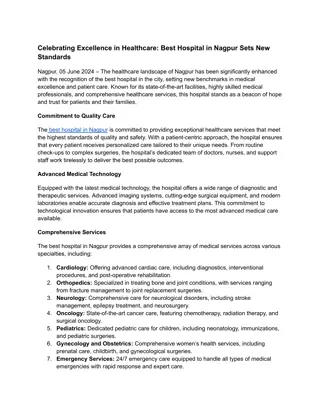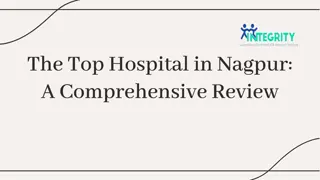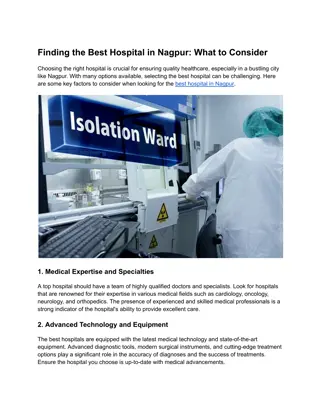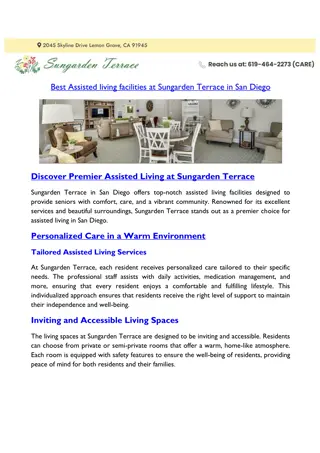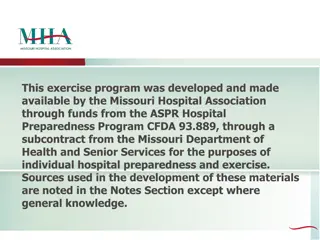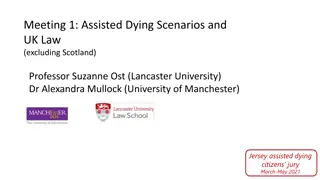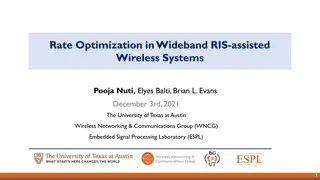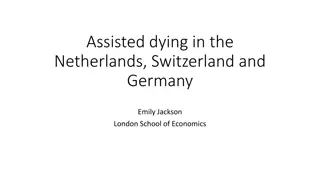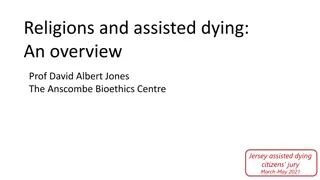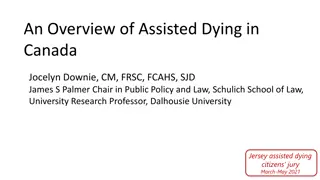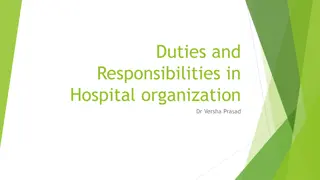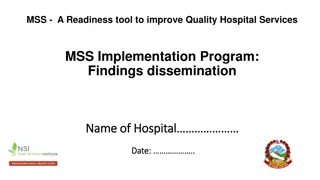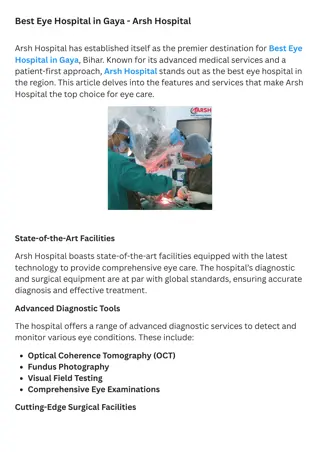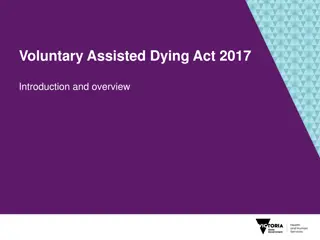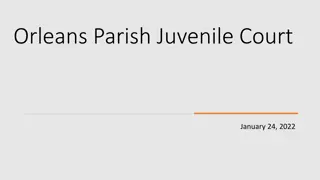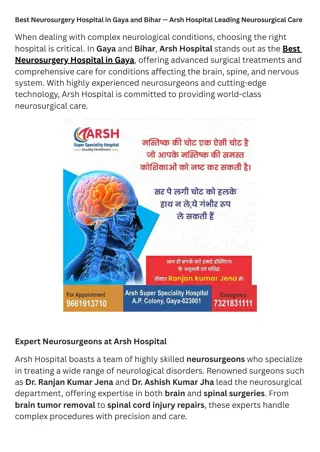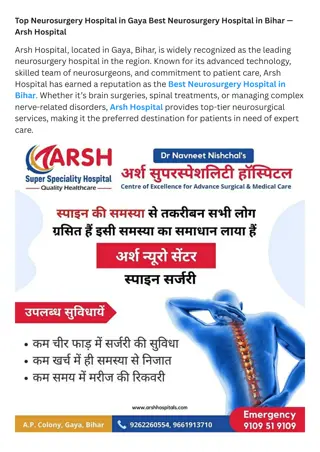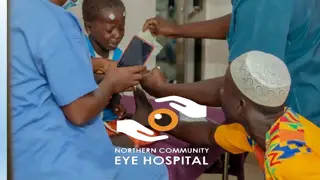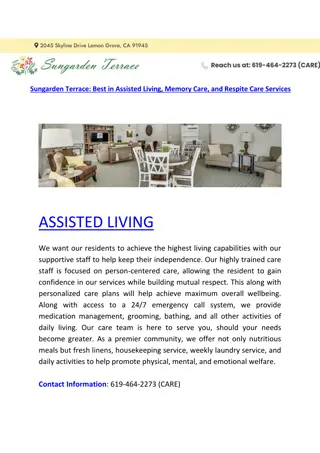Ventilator Assisted Care Program at Children's Hospital New Orleans
This program at Children's Hospital New Orleans provides ventilator-assisted care for children, ensuring they receive necessary medical support. It covers medication administration, legal rights, historical background, guidelines for care, prohibited medications, and roles and responsibilities of licensed prescribers. Through this comprehensive approach, the program aims to deliver high-quality care to children in need.
Uploaded on Sep 19, 2024 | 1 Views
Download Presentation

Please find below an Image/Link to download the presentation.
The content on the website is provided AS IS for your information and personal use only. It may not be sold, licensed, or shared on other websites without obtaining consent from the author.If you encounter any issues during the download, it is possible that the publisher has removed the file from their server.
You are allowed to download the files provided on this website for personal or commercial use, subject to the condition that they are used lawfully. All files are the property of their respective owners.
The content on the website is provided AS IS for your information and personal use only. It may not be sold, licensed, or shared on other websites without obtaining consent from the author.
E N D
Presentation Transcript
Ventilator Assisted Care Program Children s Hospital New Orleans Name___________________ Title_____________________ Email Address__________________ Telephone number _____________
Introduction Pre-test
Medication Medication Administration Administration
Its the Law Every child has a right to a free Every child has a right to a free public education. public education.
Background Information Background Information Before 1973 Before 1973 1973 Section 504 of the Rehabilitation Act 1975 Education of all Handicapped Act 1979 Legislation for a School Nurse Program 1984 Tatro 1990 Legislation Re: catheterization 1991 Non-Complex Health Procedures 1993 Act 87 Medication Administration 1995 Delegation of Selected Nursing Functions
Act 87 Medication Administration 1993 Mainstreaming
Providing Care Providing Care Louisiana State Board of Nursing (LSBN) vs Louisiana Board and of Elementary and Secondary Education (BESE)
Review of the Guidelines Each parish must promulgate guidelines Meds must be ordered by an authorized prescriber Written request and authorization from the parents/guardian Must be provided to the school in a container acceptable by pharmacy standards Clear instructions for the administration At least two employees trained
Prohibited Medications Prohibited Medications Those that can be given before or after school Those that cannot be delegated
Roles and Responsibilities Roles and Responsibilities Licensed Prescribers Authorized to Prescribe medications Physicians, Surgeons, Dentists, Doctors of Osteopathy, Advanced Registered Nurse Practitioners (ARNPs)
Who's Who? Nurses Advanced Registered Nurse Practitioner (ARNP) Registered Nurse (MSN, BSN, ADN, Diploma) Licensed Practical Nurse (LVN)
Unlicensed Assistive Personnel An unlicensed individual who is trained to function in an assistive role to the licensed nurse in the provision of student medical care as delegated by the nurse.
UAPs Role UAP s Role Receive medication and verify label match. Store medication in designated place. Administer medications as prescribed. Document. Notify and seek guidance from School Nurse/Principal.
Prohibited functions Prohibited functions of Unlicensed Assistive Personnel Shall not administer IM, IV, or SQ medication (other than emergency) Shall not administer medications by the oral inhalant aerosol route without additional training, documented proficiency, and supervision. Shall not receive any written or oral and/or telephone orders from physician and/or dentist, the parent, or other school employee. Shall not alter medication dosage as delivered from the pharmacy. Shall not administer medication to any student other than those in the specific school for which training has occurred Shall not administer any medications when there is indication that the medications was inappropriately dispensed by the pharmacist or mishandled by other individuals. Once trained, shall not refuse to administer medication without a written excuse from either the physician or the registered nurse.
Delegation Registered Nurses Registered Nurses may delegate selected nursing functions Transfers to a competent Transfers to a competent individual authority to perform the individual authority to perform the task task
Student Confidentiality ALL student information shall be kept confidential
Privacy Acts FERPA - Family Educational Rights and Privacy Act of 1974 HIPAA - Health Insurance Portability and Accountability Act of 1996
Q & A Medication Time It is time for Johnny s medication. Mrs. Jones (the secretary) calls Johnny to the office for his medication. There are five students and two parents in the office. Mrs. Jones tells Johnny these are the two Phenobarbital tablets for your seizures. Johnny takes the tablets and then return to class. Is this a violation?
Q & A Q & A Door open Mrs. Reese and Ms. Jones are two Paras in room 3 having a discussion with the door open. Mrs. Raymond s 8thgrade class are lined up in the hallway. Ms. Jones said to Mrs. Reese, I ll be glad when this day is over! Bobby needs stronger meds because he is driving me crazy. The students all laugh. Is this a violation?
Need to Know Confidentiality is a very important legal concept in the school setting. Information regarding student health information should be shared with school personnel only on a need to know basis. Need Parent Consent.
Be AWARE! Be AWARE! Do not talk about students in the hallways, classroom, cafeteria, or other parts of the building. People can figure out who you are speaking about even if you are using special terms. Do not yell confidential information to other staff down the hallways. Keep sensitive paperwork covered when working in open areas. Be mindful of your conversation when students are in the teacher s lounge or the front office.
Negligence and Malpractice Negligence and Malpractice Negligence is performing an act that a reasonably prudent person under similar circumstances would not do, or failing to perform an act that a reasonable prudent person under similar circumstances would do. Malpractice is an act of negligence by a PROFESSIONAL person, such as a physician, nurse, and dentist that is injurious practice or faulty medical treatment.
Q & A Q & A It is time for a student to receive a dose of medication. You, the nurse, and student are in the office together. The nurse prepares and draws up the medication. It is busy, noisy, and people keep interrupting. The telephone rings and the nurse answers. You look over and realize the nurse drew up the wrong medication. What do you do?
Criminal Actions Criminal Actions Assault a threat or attempt to make bodily contact. Battery an assault that is carried out. Neglect omission of any reasonable precaution, care or action. Misuse of controlled substances Use for any other purpose than the prescribed.
Reasonable Care Reasonable Care Doing only that which you have Doing only that which you have been trained to do. been trained to do. Acting as others would act in the Acting as others would act in the same or similar situations. same or similar situations.
Ethical Considerations Ethical Considerations Dignity and Respect for each individual s rights.
Golden Rule Golden Rule DO UNTO OTHERS AS YOU WOULD HAVE THEM DO UNTO YOU
What are Medications?
Forms of Medications Forms of Medications Oral Tablets, Capsules and liquids Topical Diaper rash only Rectal Suppository Emergency Medications Diastat (Diazepam)
Medication Administration Medication Administration There were 5 right Now there are 8 The Seven Rights Right Medication Right indication Right dose Right individual Right route Right time Right documentation The Eight Right Right Form
Dos and Donts Do s and Don ts Document Allergies Give your full attention to the task Remain with the individual until the medication has been taken One med at a time Distracted Give a medication from a container which has a label that you can t read Give a medication from another person s container Try to hide a medication error
Basic Principles Before administering a medication, double check the medication record to be sure the medication is in the form ordered by the physician. If the medication record says capsules, be sure you have capsules and not tablets. The prescription, medication record and pharmacy label should match.
General Practice: Learning Exercise Sample Pharmacy Label for training Prescription drug labels should be written according to the doctor s order and should include at least (Note: Change to reflect your sample label for this activity): (1) Child s name (2) Name of the drug (3) Strength of drug (4) Quantity of drug (5) Time medication should be taken (11) Expiration date/discard (6) Any directions for use or special precautions (i.e.,, SHAKE WELL) (7) Prescription date and number of refills (8) Prescriber s name (i.e.,, doctor/physician) (9) Pharmacy name, address, and phone number (10) Prescription (Rx) number for pharmacy filing date/do not use by date 33
(1) Cleary Clear _____________________________________________________________________ (2) Digoxin (generic for LANOXIN) (3) .125 mg (4) (5) Take as needed (6) Hold for heart rate less than 60 Rx (7) Fill Date: April 1, 2012 3 Refills before 07/1/2013 (8) Dr. Will Clarify, MD. (10) Rx # 772005 (9) PHARMACY 2300 Flagler Avenue Flagler Beach, LA 32136 504-555-5555 (11) Discard after 04/1/2013 Amount to be taken, Frequency, Route, Dosage (Mg/ml), Refill date too long, Discard date before the last refill, No pharmacy name. Ventilator Assisted Care Program 2015 34
Classification of Medications Prescribed Medication (Rx) Over the Counter (OTC) Controlled Medication
Medication Effects on the Body Desired Effects (Therapeutic Effects) Side Effects (Unwanted Effects) Adverse reaction (Not expected/Do not want) No Apparent Desired Effects Interactions
Allergic Reactions Life threatening Observable changes in the body Redness, swelling, itching, difficulty breathing, wheezing Seizures or even death Any symptoms
Medication Safety First dose given at home Authorization to administer medication one school term or change
Administration Guidelines Administration Guidelines- --- Abbreviations When in doubt, write it out Suggested that no one uses
Medication Storage Double locked storage Limited access Store in original container Do not dispose down the drain
Medication Errors (1) Failure to administer the medication (2) Failure to administer the right medication (3) Failure to administer the right medication to the right student (4) Failure to administer the mediation within appropriate time frames; (Unless otherwise specified, the acceptable time is 30 minutes before or after the specified time.) (5) Failure to administer the medication in the correct dosage, and (6) Failure to administer the medication by the correct route in accord with accepted practice
MEDICATION ERROR REPORT FORM DATE OF ERROR _________________________ TIME OF ERROR__________________ NAME OF PERSONINVOLVED IN ERROR RESIDENT _________________________________________________________________ EMPLOYEE________________________________________________________________ TYPE OF ERRORS (6) RIGHTS OF MEDICATION ADMINISTRATION 1) INCORRECT TIME __________________________________________________ 2) INCORRECT MEDICATION___________________________________________ 3) INCORRECT DOSAGE ______________________________________________ 4) INCORRECT ROUTE OF ADMINSTRATION ____________________________ 5) INCORRECT PATIENT RECEIVED MEDICATION _______________________ 6) INCORRECT DOCUMENTATION ______________________________________ DESCRIPTION OF ERROR IN DETAIL _________________________________________ ___________________________________________________________________________ ___________________________________________________________________________ HOW COULD THIS ERROR HAVE BEEN PREVENTED? _________________________ ___________________________________________________________________________ ___________________________________________________________________________ PERSON WHO DISCOVERED ERROR EMPLOYEE _________________________________________________________ RESIDENT __________________________________________________________ PHYSICIAN NOTIFIED _______________________________________________ BY WHOM _________________________ DATE___________ HOUR _________ SIGNATURE OF PERSON PREPARING REPORT ________________________________ SIGNATURE OF DIRECTOR OF NURSING _____________________________________
Documentation Documentation is very important. A medication record must be kept for each student. Each medication given must be recorded on a separate form. The log contains the student s name, the prescribed medication and dosage, the route the medication is to be given, the time the medication is scheduled to be given, and any student allergies. Prescription, Medication bottles, and paperwork must match. Whenever a change in the dose of the same medication is ordered by the physician, a new Medication Request form must be created. Do not give the medication if the medication label is missing or the label cannot be read. All documentation shall be recorded in ink and shall not be altered. Must use the correct form.
Documentation Documentation Not Documented Not Done!
Questions? Questions? The End
Reference Reference Louisiana Department of Education, (2006). Nurses Medication Resources Guide. Children s Hospital New Orleans Pursuant to R. S. 43:31.
Emergency Medication Administration Emergency Medication Administration Allergic reactions - Epinephrine Seizures - Diastat
Post-Test The first action you take when you are unclear about administering a medication is: A. Check with the student B. Check with the prescriber C. Do not administer the medication D. Use judgment List the Seven Rights of medication administration Name and explain what is often referred to as the Eight Right True/False To prevent the spread of germs, wash hands: True/False If the student does not come from the medication on time, you should notify the school nurse immediately.
